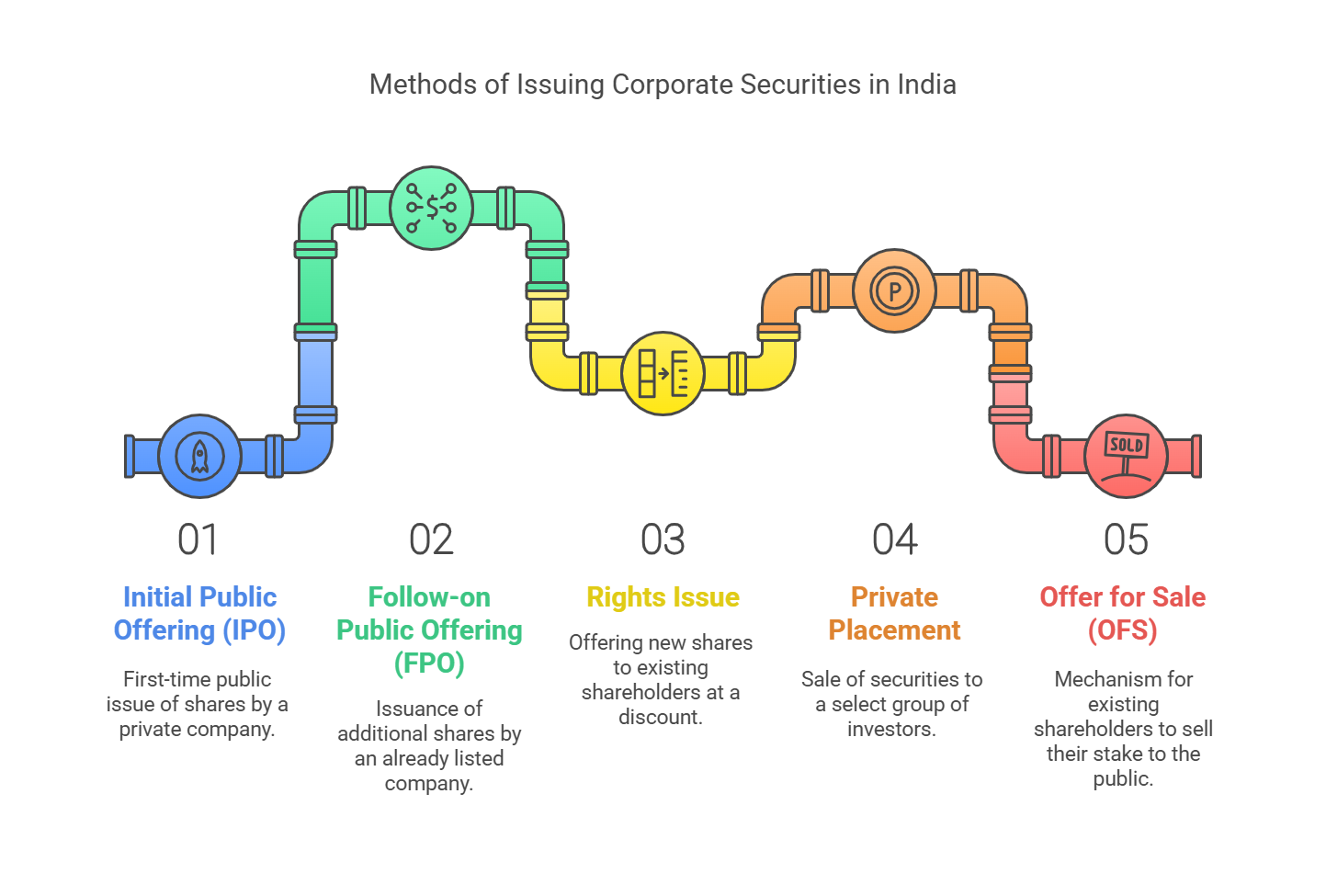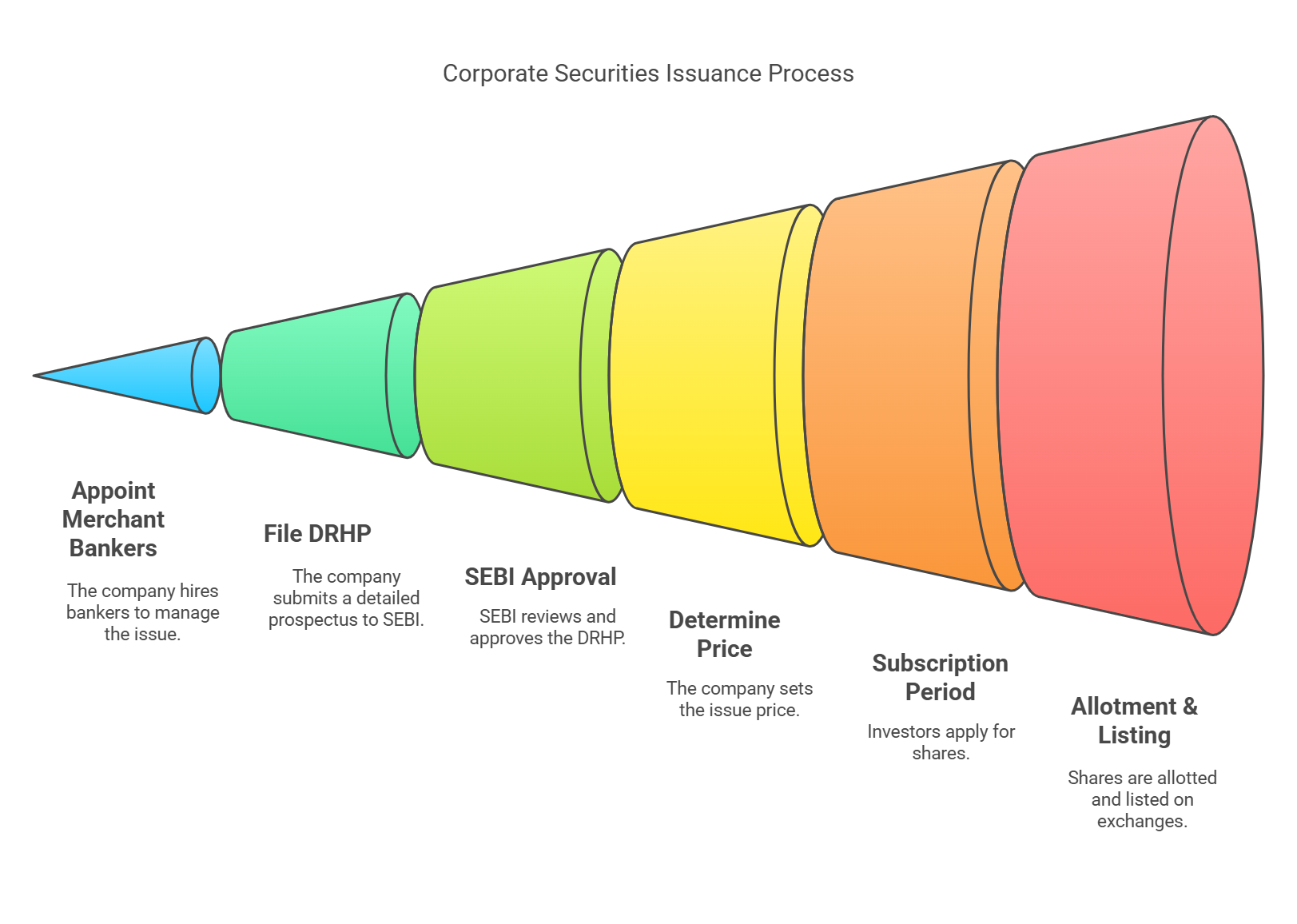Primary Market for Corporate Securities in India
1. Introduction to the Primary Market
The Primary Market is the segment of the capital market where corporate securities (both equity and debt instruments) are issued for the first time to investors. It serves as a crucial source of funding for companies, enabling them to raise capital for various purposes, including:
- Business Expansion
- Funding New Projects
- Debt Repayment
- Working Capital Requirements
Investors in the primary market purchase securities directly from the issuing company, before these securities are traded in the Secondary Market (Stock Exchange).
2. Methods of Issuing Corporate Securities in India
Companies in India use a variety of methods to issue new securities and raise capital in the primary market. These methods are regulated by the Securities and Exchange Board of India (SEBI) to ensure transparency and protect investor interests.
Primary Market for Corporate Securities in India
- Introduction to the Primary Market The Primary Market is the segment of the capital market where corporate securities (both equity and debt instruments) are issued for the first time to investors. It serves as a crucial source of funding for companies, enabling them to raise capital for various purposes, including:
 A. Initial Public Offering (IPO):
A. Initial Public Offering (IPO):
- Definition: An Initial Public Offering (IPO) is the first-time public issue of shares by a previously private company. It marks the company's entry into the public market and allows a broad range of investors to purchase shares.
-
Process:
- The company prepares a prospectus, detailing its business, financials, and the terms of the offering.
- The IPO is marketed to potential investors, and shares are offered for subscription.
- If the IPO is successful, the shares are listed on a stock exchange, where they can be traded in the secondary market.
- Outcome: Investors receive equity shares in the company, becoming part-owners, and the company gains access to a significant pool of capital.
- Regulation: IPOs are strictly regulated by SEBI under the Issue of Capital and Disclosure Requirements (ICDR) Regulations, ensuring transparency and investor protection.
- Example: Zomato, a popular food delivery company, launched its IPO in 2021, raising ₹9,375 crore.
B. Follow-on Public Offering (FPO):
- Definition: A Follow-on Public Offering (FPO) is the issuance of additional shares to the public by a company that is already listed on a stock exchange.
- Purpose: Helps the company raise additional capital for various purposes, such as funding new projects, expanding operations, or reducing debt.
- Process: Similar to an IPO, the company prepares an offer document, markets the issue to investors, and allots shares based on demand.
- Example: State Bank of India (SBI), the largest public sector bank in India, issued an FPO in 2010 to raise ₹16,500 crore.
C. Rights Issue:
- Definition: A Rights Issue is an offering of new shares to existing shareholders at a discounted price, in proportion to their current holdings.
- Purpose: Allows the company to raise capital while giving existing shareholders the opportunity to maintain their ownership stake and participate in the company's growth.
- Process: The company announces the rights issue, specifying the ratio of new shares to existing shares, the issue price, and the subscription period. Existing shareholders have the right, but not the obligation, to subscribe to the new shares.
- Example: Reliance Industries Ltd. (RIL), one of India's largest conglomerates, issued a ₹53,125 crore rights issue in 2020.
D. Private Placement:
- Definition: Private Placement involves the sale of securities to a select group of investors, such as institutional investors, high-net-worth individuals, or accredited investors, rather than offering them to the general public.
- Advantages: Offers a faster and more cost-effective way to raise capital compared to a public offering, as it avoids the lengthy and expensive regulatory processes associated with IPOs and FPOs.
-
Types:
- Preferential Allotment: Shares are issued to specific investors at a pre-determined price, subject to certain regulatory requirements.
- Qualified Institutional Placement (QIP): Shares are issued to Qualified Institutional Buyers (QIBs), such as mutual funds, insurance companies, and foreign institutional investors, under a simplified process.
- Example: HDFC Bank, a leading private sector bank in India, raised ₹15,000 crore via QIP in 2020.
E. Offer for Sale (OFS):
- Definition: Offer for Sale (OFS) is a mechanism that allows promoters and existing shareholders of a listed company to sell their stake to the public through the stock exchange.
- Purpose: Used primarily for disinvestment of government holdings in Public Sector Undertakings (PSUs) and for promoters to reduce their stake to comply with regulatory requirements.
- Process: The selling shareholders announce the OFS, specify the number of shares to be sold, and set a floor price. Investors can then place bids for the shares through their brokers.
- Example: Coal India, a major PSU in the coal mining sector, conducted an OFS in 2015, raising ₹22,600 crore.
3. Process of Issuing Corporate Securities in India
Step 1: Appointing Merchant Bankers:
- The company hires merchant bankers (also known as investment banks) to manage the issue. Merchant bankers provide expertise in structuring the offering, preparing the offer document, marketing the issue to investors, and ensuring compliance with regulatory requirements.
- Examples of merchant bankers in India include ICICI Securities, Kotak Mahindra Capital, and JM Financial.
Step 2: Filing a Draft Red Herring Prospectus (DRHP):
- The company files a draft prospectus, known as the Draft Red Herring Prospectus (DRHP), with SEBI.
- The DRHP contains detailed information about the company, including its financials, business model, risk factors, and the purpose of the offering.
- The DRHP is made available to the public for review and feedback.
Step 3: SEBI Approval:
- SEBI reviews the DRHP to ensure that it contains all necessary disclosures and complies with regulatory requirements.
- SEBI may seek clarifications or request additional information from the company before approving the DRHP.
Step 4: Price Determination:
- The company, in consultation with its merchant bankers, determines the issue price of the securities. This can be done through two main methods:
- Fixed Price Issue: The price is set before the issue opens, and investors apply for shares at that fixed price.
- Book Building Process: Investors place bids within a price band, and the final price is determined based on the demand revealed through the bidding process.
Step 5: Subscription Period:
- Investors apply for shares during the subscription period, which typically lasts for a few days.
- Applications are submitted through the Application Supported by Blocked Amount (ASBA) facility, where the application money is blocked in the investor's bank account until allotment.
Step 6: Allotment & Listing on Stock Exchange:
- After the subscription period closes, the company and its merchant bankers determine the basis of allotment, deciding how the shares will be allocated to investors.
- Shares are then allotted to successful applicants, and the blocked funds are debited from their bank accounts.
- Finally, the shares are listed on the designated stock exchanges (BSE, NSE), where they can be traded in the secondary market.
4. Importance of the Primary Market
The primary market for corporate securities plays a vital role in the Indian economy:
- Capital Formation: Provides a mechanism for companies to raise capital for growth, expansion, and innovation.
- Encourages Public Investment: Offers investment opportunities to retail and institutional investors, allowing them to participate in the growth of Indian businesses.
- Liquidity & Market Growth: Contributes to the overall liquidity and growth of the financial market.
- Wealth Creation: Helps investors earn returns through capital appreciation and dividends, contributing to wealth creation.
Conclusion:
The primary market for corporate securities is a crucial engine for economic growth in India. It facilitates the flow of savings into productive investments, enables companies to raise capital efficiently, and provides a range of investment opportunities for the public. The regulatory framework established by SEBI ensures transparency and investor protection, promoting confidence and stability in the market.


No Comments